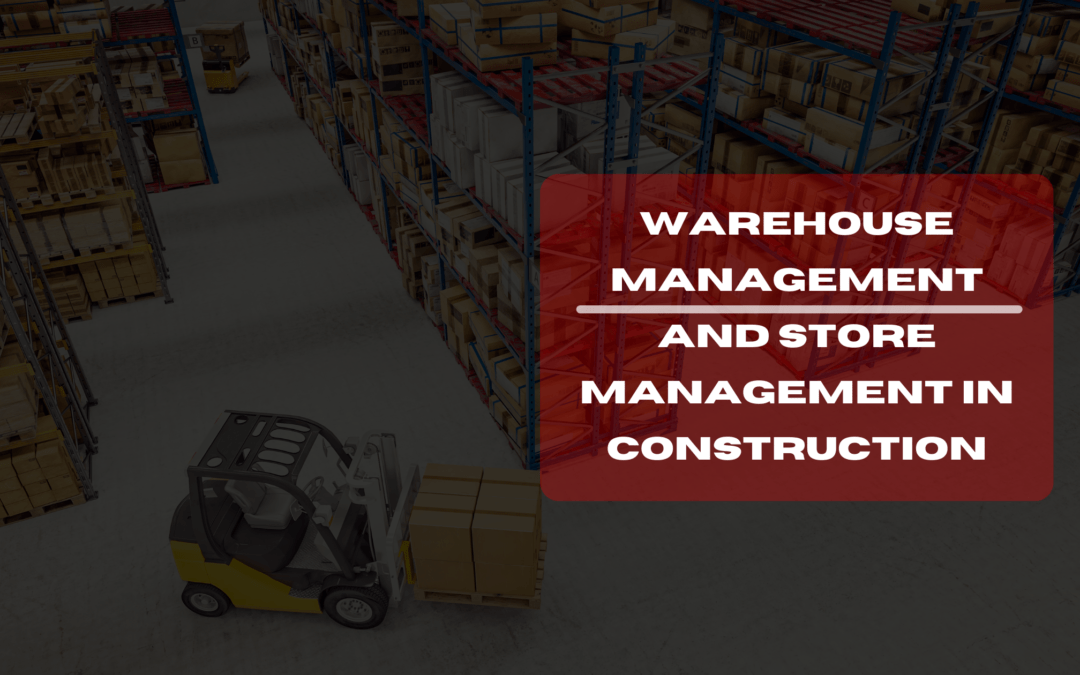Warehouse Management and Store Management in Construction
Warehouse management and store management are two indispensable aspects of construction project resource management. While they both deal with the storage and control of construction materials, they have distinct purposes and operational characteristics. In this article, we will delve into the differences between warehouse management and store management in the context of construction projects, shedding light on their unique roles and significance.
Table of Contents
Understanding Warehouse Management
Definition: Warehouse management in construction refers to the systematic control, organization, and supervision of a physical facility known as a warehouse. This facility serves as a centralized storage location for a wide range of construction materials, machinery, and equipment.
Key Characteristics of Warehouse Management:
- Scale: Warehouses are typically large and spacious, designed to accommodate a diverse array of construction materials and equipment. They have substantial storage capacity.
- Location: Warehouses are strategically positioned, often in proximity to construction sites or in areas that facilitate efficient transportation and distribution.
- Inventory Management: Warehouse management involves the meticulous tracking, organizing, and monitoring of inventory levels. It deals with a diverse range of materials in significant quantities.
- Equipment Handling: Warehouses may house heavy machinery and equipment, which requires specialized handling and maintenance.
- Distribution Hub: Warehouses often function as distribution hubs, where materials are received, sorted, and dispatched to various construction sites or stores based on project needs.
Understanding Store Management
Definition: Store management in construction pertains to the management of smaller, decentralized storage locations, often referred to as stores or storage areas. These stores are strategically positioned within or near construction sites to provide quick and convenient access to essential materials during ongoing projects.
Key Characteristics of Store Management:
- Scale: Stores are relatively smaller in size compared to warehouses. They are designed to accommodate materials needed for specific phases of a construction project.
- Proximity to Worksite: Stores are typically located in close proximity to the construction site they serve. This ensures rapid access to materials required for immediate tasks.
- Material Specificity: Stores primarily stock materials and supplies needed for particular tasks or phases of a construction project. For instance, a store near the foundation work area may stock concrete and reinforcing bars.
- Inventory Control: Store management emphasizes meticulous control over materials specific to immediate construction requirements. Inventory levels are closely monitored to prevent shortages or overstocking.
- Ease of Access: Stores are strategically positioned to provide easy access for construction crews. This minimizes downtime and delays associated with waiting for materials to be transported from a central warehouse.
Key Differences Between Warehouse Management and Store Management
Now, let’s explore the key differences that distinguish warehouse management from store management:
- Purpose: Warehouse management primarily focuses on storing and managing a wide variety of construction materials, machinery, and equipment on a larger scale. In contrast, store management is geared towards providing quick and convenient access to specific materials needed for immediate construction tasks.
- Scale: Warehouses are larger and possess greater storage capacity, catering to bulk materials and equipment. Stores are smaller and store materials specific to the current phase or area of the construction site.
- Location: Warehouses are often strategically located for efficient distribution to multiple construction sites. Stores are positioned in close proximity to the specific site they serve, minimizing transportation time.
- Inventory Management: Warehouse management involves the complex task of overseeing a diverse range of materials in substantial quantities. Store management focuses on controlling materials tailored to immediate project requirements.
- Distribution: Warehouses often serve as distribution centers for multiple construction sites, handling a wide range of materials. Stores primarily serve the construction site they are situated in or nearby, supplying materials specific to that site’s needs.
“Efficiency is doing things right; effectiveness is doing the right things.” – Peter Drucker
This insightful quote by management guru Peter Drucker underscores the importance of both warehouse management and store management in construction projects. While warehouse management ensures the efficiency of material storage and distribution on a broader scale, store management ensures the effectiveness of material access and availability precisely where and when it’s needed.
In conclusion, warehouse management and store management are complementary components of construction project resource management. Understanding their differences and roles is essential for efficient resource allocation, cost control, and timely project execution in the construction industry. Both aspects contribute to the overall success and productivity of construction projects, ensuring that materials are handled effectively throughout the project’s lifecycle.

